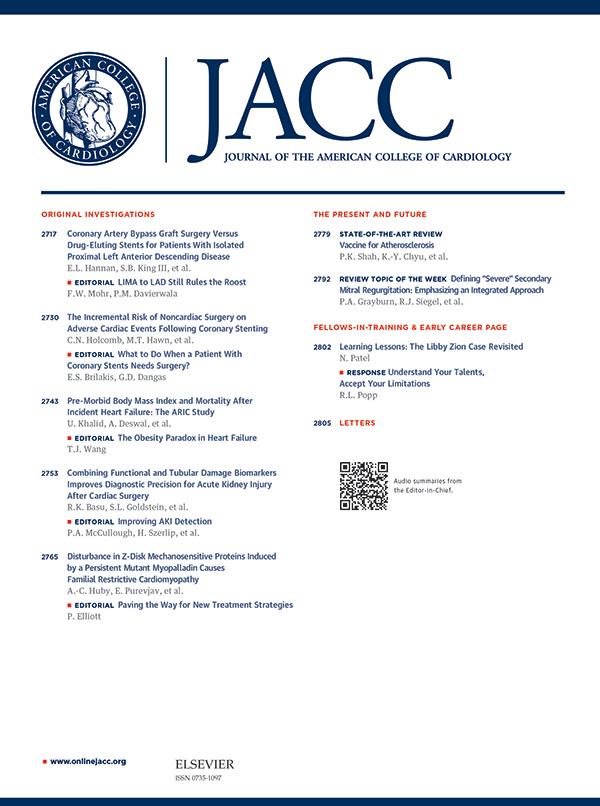Why Have We Not Been Able to Demonstrate Reduced Mortality in Patients With HFmrEF/HFpEF?
IF 21.7
1区 医学
Q1 CARDIAC & CARDIOVASCULAR SYSTEMS
引用次数: 0
Abstract
No randomized controlled trial has yet demonstrated a statistically significant reduction in mortality in patients with heart failure and mildly reduced ejection (HFmrEF) or heart failure and preserved ejection fraction (HFpEF), in contrast to the benefits observed in heart failure with reduced ejection fraction (HFrEF). However, this probably reflects the statistical power of trials to date to show an effect on mortality rather than mechanistic differences between HFmEF/HFpEF and HFrEF or differences in treatment efficacy. Compared to patients with HFrEF, those with HFmrEF/HFpEF have lower mortality rates and a smaller proportion of potentially modifiable cardiovascular deaths (as opposed to unmodifiable noncardiovascular deaths). In addition, some causes of cardiovascular deaths may not be reduced by treatments for HF. Therefore, the low rate of potentially modifiable deaths in patients with HFmrEF/HFpEF, compared with HFrEF, has made it challenging to demonstrate a reduction in death (or cardiovascular death) in trials to date.
为什么我们无法证明 HFmrEF/HFpEF 患者的死亡率降低了?
与射血分数降低的心力衰竭(HFrEF)所观察到的益处相比,目前还没有随机对照试验证明射血分数轻度降低的心力衰竭(HFmrEF)或射血分数保留的心力衰竭(HFpEF)患者的死亡率在统计学上有显著降低。不过,这可能反映了迄今为止的试验在统计学上对死亡率的影响,而不是 HFmEF/HFpEF 和 HFrEF 之间的机理差异或疗效差异。与 HFrEF 患者相比,HFmrEF/HFpEF 患者的死亡率较低,潜在可改变的心血管死亡(相对于不可改变的非心血管死亡)比例较小。此外,心血管死亡的某些原因可能不会因治疗心房颤动而减少。因此,与 HFrEF 相比,HFmrEF/HFpEF 患者潜在可改变的死亡率较低,这使得在迄今为止的试验中证明减少死亡(或心血管死亡)具有挑战性。
本文章由计算机程序翻译,如有差异,请以英文原文为准。
求助全文
约1分钟内获得全文
求助全文
来源期刊
CiteScore
42.70
自引率
3.30%
发文量
5097
审稿时长
2-4 weeks
期刊介绍:
The Journal of the American College of Cardiology (JACC) publishes peer-reviewed articles highlighting all aspects of cardiovascular disease, including original clinical studies, experimental investigations with clear clinical relevance, state-of-the-art papers and viewpoints.
Content Profile:
-Original Investigations
-JACC State-of-the-Art Reviews
-JACC Review Topics of the Week
-Guidelines & Clinical Documents
-JACC Guideline Comparisons
-JACC Scientific Expert Panels
-Cardiovascular Medicine & Society
-Editorial Comments (accompanying every Original Investigation)
-Research Letters
-Fellows-in-Training/Early Career Professional Pages
-Editor’s Pages from the Editor-in-Chief or other invited thought leaders

 求助内容:
求助内容: 应助结果提醒方式:
应助结果提醒方式:


